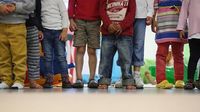The German federal government has taken significant steps in efforts to alleviate financial burdens on families by announcing an increase in Kindergeld and discussing future adjustments to Kinderfreibetrag. As of January 1, 2025, the monthly Kindergeld will rise to 255 Euro per child, marking a necessary support boost amidst rising living costs.
This increase was confirmed by the Bundesfamilienministerium, highlighting the government's dedication to improving financial relief for families. Alongside the increase in Kindergeld, the Kinderfreibetrag, which supports parents by reducing taxable income, has also seen an increase of 60 Euro per child per year.
With the rise in Kindergeld, families with one child will receive 255 Euro monthly, doubling to 510 Euro for two children. The support will continue to grow based on the number of children, and typical families can expect to see substantial increases in their monthly payments. For instance, a family with three children will receive 765 Euro monthly, while those with ten children could gain as much as 2,550 Euro per month.
The discussions around Kindergeld do not stop at mere increases, however. The recently concluded Bundestagswahl in 2025 has catalyzed negotiations between CDU/CSU and the SPD regarding deeper reforms. A key element in these discussions is the potential adjustment of Kindergeld for families whose children reside within the European Union. According to the CDU/CSU election manifesto, "the Kinderfreibetrag aims to be developed towards the Grundfreibetrag of parents," indicating a plan for comprehensive reform.
While proposing future increases, the CDU/CSU also revealed intentions to systematically adjust Kindergeld for children living abroad. This would entail aligning the payment amounts with living costs in respective countries. The Union noted issues surrounding fairness in benefits for families living in varying economic conditions across Europe.
This is particularly relevant as approximately 525.7 million Euro in Kindergeld was paid to foreign accounts in 2023, with significant funds directed towards families in Poland, where over 120,000 children claim support. Data indicated that the cost of living in Germany is 8.5% higher than the EU average, while Poland’s is significantly lower by 32.6%. This raises critical questions about the appropriateness of current payments to families whose costs may be significantly less than those seen in Germany.
Additionally, it is essential to recognize the impact of employment on Kindergeld claims. For students in particular, their ability to receive this financial support hinges on maintaining specific academic progress and ensuring their work hours do not exceed stipulated limits without risking their benefits.
While some potential cuts proposed by the CDU/CSU may impact families living abroad, these plans are accompanied by significant political contention. Olaf Scholz, the SPD leader, has expressed skepticism about the financial feasibility of the Union's broader election proposals. He has criticized the Union for lacking realistic financial solutions, claiming, "the election program is not financially feasible," which has resonated among skeptics of any austere financial measures proposed.
To some, the adjustments suggested may offer a way to safeguard financial resources for domestic families while addressing issues of equity regarding EU nationals. The Union has claimed that adjusting payments to different living costs could stabilize state finances overall. As they navigate these discussions, the path forward for families receiving Kindergeld remains uncertain.
In summary, the German government's commitment to enhancing financial support for families through increased Kindergeld and Kinderfreibetrag underscores the broader social responsibility felt towards families amid economic strain. However, as coalition negotiations continue, it will be essential to monitor how these financial strategies will play out, particularly for families with children living in, or having ties to, other EU countries.






